
|
Astronomy Picture Of the Day (APOD)
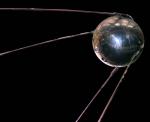 50th Anniversary of Sputnik: Traveling Companion
50th Anniversary of Sputnik: Traveling Companion
4.10.2007
Sputnik means "traveling companion". Despite the innocuous sounding name, the launch of planet Earth's first artificial moon, Sputnik 1, by the Soviet Union on October 4, 1957, changed the world and set in motion events which resulted in the creation of NASA and the race to the Moon.
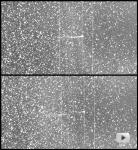 Comet Encke s Tail Ripped off
Comet Encke s Tail Ripped off
3.10.2007
Swinging inside the orbit of Mercury, on April 20th periodic comet Encke encountered a blast from the Sun in the form of a Coronal Mass Ejection (CME). When CMEs, enormous clouds of energetic particles ejected from the Sun, slam into Earth's magnetosphere, they often trigger auroral displays.
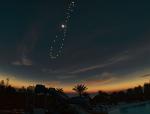 Tutulemma: Solar Eclipse Analemma
Tutulemma: Solar Eclipse Analemma
2.10.2007
If you went outside at exactly the same time every day and took a picture that included the Sun, how would the Sun appear to move? With great planning and effort, such a series of images can be taken. The figure-8 path the Sun follows over the course of a year is called an analemma.
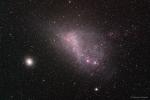 APOD: 2007 October 1- The Small Cloud of Magellan
APOD: 2007 October 1- The Small Cloud of Magellan
1.10.2007
Portuguese navigator Ferdinand Magellan and his crew had plenty of time to study the southern sky during the first circumnavigation of planet Earth. As a result, two celestial wonders easily visible for southern hemisphere skygazers are known as the Clouds of Magellan.
30.09.2007
Most bright stars in our Milky Way Galaxy reside in a disk. Since our Sun also resides in this disk, these stars appear to us as a diffuse band that circles the sky.
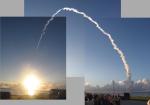 Dawn Launch Mosaic
Dawn Launch Mosaic
29.09.2007
Shortly after sunrise on Thursday at Cape Canaveral Air Force Station, the Dawn spacecraft began its journey to the asteroid belt, arcing eastward into a blue and cloudy sky. Dawn's voyage began on a conventional, chemically fueled Delta II rocket, but will continue with an innovative ion propulsion system.
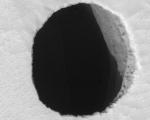 A Hole in Mars Close Up
A Hole in Mars Close Up
28.09.2007
In a close-up from the HiRISE instrument onboard the Mars Reconnaissance Orbiter, this mysterious dark pit, about 150 meters across, lies on the north slope of ancient martian volcano Arsia Mons. Lacking raised rims...
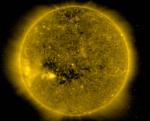 Hole in the Sun
Hole in the Sun
27.09.2007
The dark expanse below the equator of the Sun is a coronal hole -- a low density region extending above the surface where the solar magnetic field opens freely into interplanetary space. Shown in false color, the picture was recorded on September 19th in extreme ultraviolet light by the EIT instrument onboard the space-based SOHO observatory.
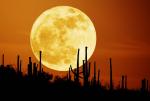 Saguaro Moon
Saguaro Moon
26.09.2007
A Full Moon rising can be a dramatic celestial sight, and Full Moons can have many names. For example, tonight's Full Moon, the one nearest the autumnal equinox in the northern hemisphere, is popularly called the Harvest Moon.
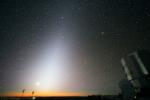 Zodiacal Light and the False Dawn
Zodiacal Light and the False Dawn
25.09.2007
An unusual triangle of light will be particularly bright near the eastern horizon before sunrise during the next two months for observers in Earth's northern hemisphere. Once considered a false dawn, this triangle of light is actually Zodiacal Light, light reflected from interplanetary dust particles.
|
January February March April May June July August September October November December |
|||||||||||||||||||||||||||||||||||||||||||||||||